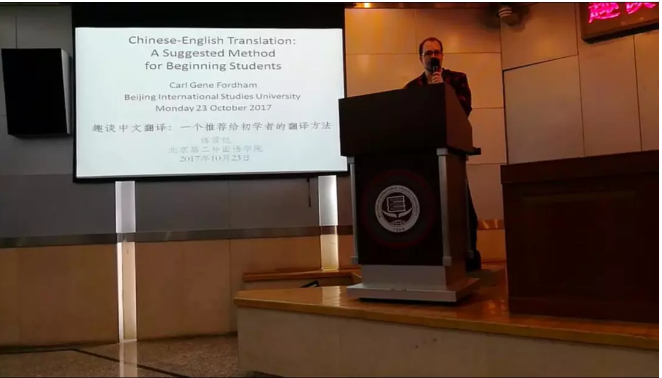无意中读到一位在京外教的博文,标题为《20 Actually Useful Chengyu (成语)》,20个常用成语。这位作者有一个很言情的中文名字:傅君恺。文中不仅注明了每个成语的拼音、英文解释、英文翻译,还注明了英文中对应的地道表达,并举例。博文后面的留言部分也很精彩,感兴趣的读者可以点击“阅读原文”查看。不想看前面英文部分的话,可以直接下拉到成语。

Most advanced learners, I think, have a love-hate relationship with chengyu (成语), those pesky, mostly four-character idioms taken from classical China. Sure, you get learners who are obsessed with them and endeavour to memorise one hundred a month only to find their practical usage is hazy to say the least. (It’s also very difficult at times to discertain their true register, not to mention their grammatical usage.) You also get learners (like myself) who have, through the years, avoided them like the plague and have only bothered to absorb those that have actually come up in written texts or conversation. But are chengyu useful for learners and, if so, which ones are the best to learn?
Unfortunately, there are few resources – both on the web or in print – that actually tell you which chengyu are worth remembering. This is actually an important question considering that there are tens of thousands of them. Most textbooks simply give you a list of 100 or so and expect you to memorise them all, without actually telling you how they fit into a modern context. The worst are those massive lists you find on the Internet, often sourced from Chinese schools. These are merely lists of idioms that Chinese students are expected to learn at school and, whilst many of them may be well-known, native speakers simply don’t use them as often as you would expect.
Thus I’ve carefully crafted this list to help intermediate and advanced learners become more aware of chengyu that are actually useful. It does not purport to be an exhaustive list of the most useful chengyu – indeed, I’ve left many out, simply because they are too context-specific. Nor is it a list of the most common chengyu – there are other resources for that. Note also that I haven’t included the detailed stories for all of them (some of them are quite complicated); what is more important, I think, is to understand the logic of their composition. If you happen to know the history behind it, though, then that’s surely a bonus. If you’re curious, Baidu will certainly help you out.
But why learn them at all? Well, first and foremost, they’re interesting and – at times – unusual, so they do help spice up your language a little bit. They also offer a little gem of Chinese wisdom, which is great for enhancing your cultural understanding of the language. Moreover, from time to time they help with your comprehension of classical Chinese by learning the odd character in an idiomatic context. This can come in handy when you see the same character used in again in a different context. The main thing, though, is to have fun with them and try to use them with your friends – it’s always good fun to see their reaction, and it can be an important learning experience too.
1. 脱颖而出 tuōyǐng’érchū
Baidu Hits: 51,100,000 Google Hits: 32,100,000
Explanation (解释): Literally, “the grain sheds its husk and comes forth.”
Translation (翻译): To fully expose one’s talent.
Similar English Expression (类似英文成语): To come to the fore.
Example (例子): 他在比赛中脱颖而出。Tā zài bǐsài zhōng tuōyǐngérchū. — He came to the fore in the competition.
2. 一丝不苟 yīsībùgǒu
Baidu Hits: 25,000,000 Google Hits: 12,800,000
Explanation (解释): Literally, “一丝 [even] a little bit 不苟 not careless – to attend to every thread.”
Translation (翻译): To be meticulous; to attend to every detail.
Similar English Expression (类似英文成语): To cross one’s T’s
Example (例子): 他做事从来都是一丝不苟。Tā zuòshì cónglái dōu shì yīsībùgǒu. — He’s always meticulous in everything he does.
3. 司空见惯 sīkōngjiànguàn
Baidu Hits: 14,400,000 Google Hits: 8,570,000
Explanation (解释): Long story short – 司空 comes from the title of “the Minister of Construction” in ancient China who commented on “sing-song girls” during a feast as 见惯 (“a common sight”).
Translation (翻译): To be an everyday occurrence; nothing unusual.
Similar English Expression (类似英文成语): None (unless you can think of one).
Example (例子): 在中国,闯红灯是司空见惯的事。Zài Zhōngguó, chuǎnghóngdēng shì sīkōngjiànguàn de shì. — In China, people running red lights is a common sight.
4. 半途而废 bàntú’érfèi
Baidu Hits: 13,400,000 Google Hits: 8,360,000
Explanation (解释): Literally, “半途 half-way 而 yet 废 is given up/is wasted.”
Translation (翻译): To give up halfway; to leave something unfinished.
Similar English Expression (类似英文成语): To throw the towel in (sort of).
Example (例子): 小时候我学钢琴半途而废。Xiǎoshíhou wǒ xué gāngqín bàntúérfèi. — When I was little I tried to learn how to play the piano but gave up.
5. 不可思议 bùkěsīyì
Baidu Hits: 100,000,000 Google Hits: 7,930,000
Explanation (解释): Literally, “不可 cannot be 思议 conceived.”
Translation (翻译): To be inconceivable; unbelievable.
Similar English Expression (类似英文成语): None (off the top of my head).
Example (例子): 对我来说,吃狗肉是不可思议的事情。Duì wǒ lái shuō, chī gǒuròu shì bùkěsīyì de shìqíng. — The way I see it, eating dog is inconceivable.
6. 一鸣惊人 yīmíngjīngrén
Baidu Hits: 11,600,000 Google Hits: 7,760,000
Explanation (解释): Literally, “one chirp [which] surprises people”, a metaphor for someone suddenly displaying talent.
Translation (翻译): To become famous overnight.
Similar English Expression (类似英文成语): To set the world on fire.
Example (例子): 李玉春一鸣惊人。Lǐ Yǔchūn yīmíngjīngrén. — Li Yuchun became famous overnight.
7. 一窍不通 yīqiàobùtōng
Baidu Hits: 11,900,000 Google Hits: 7,570,000
Explanation (解释): 一 (“all”) 窍 (the [seven] orifices”) 不通 (“not linked up”).
Translation (翻译): To be completely ignorant about something; to be out of one’s depth.
Similar English Expressions (类似英文成语): To not know one’s arse from one’s elbow (hah!); to be “all Greek” to someone.
Example (例子): 他对电脑一窍不通。Tā duì diànnǎo yīqiàobùtōng. — He doesn’t know the first thing about computers.
8. 谈何容易 tánhéróngyì
Baidu Hits: 11,600,000 Google Hits: 7,420,000
Explanation (解释): 谈 (“to speak”) + 何 (classical Chinese, meaning “什么” [what]) + 容易 (“easy”); “in what way is it easy?”
Translation (翻译): To be no means easy; difficult to do.
Similar English Expression (类似英文成语): Easier said than done.
Example (例子): 我跟他分手谈何容易。Wǒ gēn tā fēnshǒu tánhéróngyì. — Breaking up with him is easier said than done.
9. 自由自在 zìyóuzìzài
Baidu Hits: 31,400,000 Google Hits: 6,160,000
Explanation (解释): 自由 (“free”) + 自在 (“lacking restrictions”)
Translation (翻译): To be carefree; to be peaceful and relaxed.
Similar English Expressions (类似英文成语): To not have a care in the world; to be footloose and fancy-free; to be man or woman of leisure.
Example (例子): 我想自由自在的生活。Wǒ xiǎng zìyóuzìzài de shēnghuó. — I want a carefree life.
10. 乱七八糟 luànqībāzāo
Baidu Hits: 59,300,000 Google Hits: 4,200,000
Explanation (解释): 乱 (“chaotic”) + 七 (“seven”) + 八 (“eight”) + 糟 (“rotten; in a wretched state”)
Translation (翻译): To be in a huge mess.
Similar English Expression (类似英文成语): To be at sixes and sevens.
Example (例子): 这个公司的管理乱七八糟。Zhè ge gōngsī de guǎnlǐ luànqībāzāo. — This company’s administration is a complete mess.
11. 一见钟情 yījiànzhōngqíng
Baidu Hits: 37,200,000 Google Hits: 3,850,000
Explanation (解释): 一见 (“upon first seeing”) + 钟情 (“to fall deeply in love”)
Translation (翻译): To fall in love at first sight.
Similar English Expression (类似英文成语): Same as above.
Example (例子): 我跟我的男朋友一见钟情。Wǒ gēn wǒ de nán péngyǒu yījiànzhōngqíng. — I fell in love with my bofriend at first sight.
12. 爱不释手 àibùshìshǒu
Baidu Hits: 24,500,000 Google Hits: 2,460,000
Explanation (解释): Literally, “to love and not let go of.”
Translation (翻译): To love something too much to part with it.
Similar English Expression (类似英文成语): None (that I can think of).
Example (例子): 我对我的新玩具爱不释手!Wǒ duì wǒ de xīn wánjù àibùshìshǒu! — I simply can’t put down my new toy!
13. 一无所有 yīwúsuǒyǒu
Baidu Hits: 29,500,000 Google Hits: 2,220,000
Explanation (解释): 一 (in classical Chinese it means 全 or 都 [“everything”]) + 无 (“not”) + 所有 (“have”)
Translation (翻译): To not own a thing in the world.
Similar English Expression (类似英文成语): To not have a thing to one’s name.
Example (例子): 如果你离开了我,我就一无所有。Rúguǒ nǐ líkāi le wǒ, wǒ jiù yīwúsuǒyǒu. — If you leave me, I’ll have nothing left.
14. 自相矛盾 zìxiāngmáodùn
Baidu Hits: 9,270,000 Google Hits: 747,000
Explanation (解释): 自相 (“self-”) + 矛盾 (“contradictory”), from the famous story about the man who bragged he could sell a spear (矛) that could pierce anything in the world and a shield (盾) that was impenetrable to any spear, an obvious paradox.
Translation (翻译): To contradict oneself.
Similar English Expression (类似英文成语): None (I’m guessing).
Example (例子): 你说的话自相矛盾。Nǐ shuō de huà zìxiāngmáodùn. — You’re contradicting yourself.
15. 倾盆大雨 qīngpéndàyǔ
Baidu Hits: 6,680,000 Google Hits: 468,000
Explanation (解释): 倾盆 (“pouring hard”) + 大雨 (“heavy rain”)
Translation (翻译): Heavy rain; downpour.
Similar English Expression (类似英文成语): To rain cats and dogs.
Example (例子): 今 天上午突然下起了倾盆大雨,所以比赛临时取消了。Jīntiān shàngwǔ tūrán xiàqǐ le qīngpéndàyǔ, suǒyǐ bǐsài línshí qǔxiāo le. — The competition was postponed this morning because of the sudden downpour.
16. 画蛇添足 huàshétiānzú
Baidu Hits: 6,340,000 Google Hits: 447,000
Explanation (解释): Literally, “[when] drawing [a] snake, add [a] foot”.
Translation (翻译): To ruin the effect my adding something superfluous.
Similar English Expression (类似英文成语): To gild the lily (old-fashioned).
Example (例子): 发明这两个多余的电钮纯粹是画蛇添足。Fāmíng zhè liǎng gè duōyú de diànniǔ chúncuì shì huàshétiānzú — The two extra buttons on this invention is really overdoing it.
17. 守口如瓶 shǒukǒurúpíng
Baidu Hits: 5,220,000 Google Hits: 438,000
Explanation (解释): Literally,”to keep [one’s] mouth shut, like [a] bottle.”
Translation (翻译): To keep one’s mouth shut; to not breathe a word.
Similar English Expression (类似英文成语): To keep one’s lips sealed.
Example (例子): 总理对这个问题守口如瓶。Zǒnglǐ duì zhège wèntí shǒukǒurúpíng. — The president was tight-lipped about this issue.
18. 塞翁失马 sàiwēngshīmǎ
Baidu Hits: 4,800,000 Google Hits: 319,000
Explanation (解释): 塞翁失马: ”When the old man from the frontier lost his horse…”, often followed by the second part 焉知非福: ”How could one have known that it would not be fortuitous?” You can read more about the story in both English and Chinese at Wiktionary.
Translation (翻译): A setback may turn out to be a blessing in disguise.
Similar English Expression (类似英文成语): A blessing in disguise; every cloud has a silver lining.
Example (例子): 我 不小心摔倒了,碰伤了自己,但却在地板上发现了一张50元的纸币,真是塞翁失马 啊!Wǒ bù xiǎoxīn shuāi dǎo le, pèng shāng le zìjǐ, dàn què zài dìbǎn shàng fāxiàn le yī zhāng wǔ shí yuán de zhǐbì, zhēnshi sàiwēngshīmǎ a— I fell over and hurt myself, but on the floor I found a fifty dollar note – what a blessing in disguise!
19. 对牛弹琴 duìniútánqín
Baidu Hits: 4,400,000 Google Hits: 276,000
Explanation (解释): “To play a qin (a traditional Chinese musical instrument) to a cow.”
Translation (翻译): To address the wrong listener.
Similar English Expression (类似英文成语): To cast pearls before swine. (old-fashioned)
Example (例子): 跟一个不讲道理的人讲道理是对牛弹琴。Gēn yīgè bù jiǎng dàolǐ de rén jiǎng dàolǐ shì duìniútánqín. — Trying to talk sense to an irrational person is like casting pearls before swine.
20. 九牛一毛 jiǔniúyīmáo
Baidu Hits: 3,190,000 Google Hits: 225,000
Explanation (解释): Literally, “nine cows, one hair.”
Translation (翻译): An insignificant number in the midst of an enormous quantity.
Similar English Expression (类似英文成语): A drop in the ocean; a drop in a bucket.
Example (例子): 一块钱对一个大款来说是九牛一毛。Yīkuài qián duì yīgè dàkuǎn lái shuō shì jiǔniúyīmáo. — One dollar to a millionaire is a drop in the ocean.
最后,为了防止其他外国人乱用成语,作者还很有远见地写了一个免责声明。
Disclaimer: Although example sentences are original and checked for smoothness, don’t forget that chengyu are, by their nature, formal/literary constructions and so are not commonly used in conversation (unless you want to sound highly educated). Thus this stuff is most useful for diary entries, stories, websites and other written documents. Be sure to check your own constructed sentences with a native speaker before memorising them!











